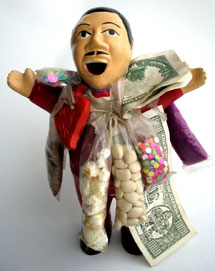
 Ekeko is a god of good luck in Peru and the surrounding region.
Photo by Marjorie Manicke.
Ekeko is a god of good luck in Peru and the surrounding region.
Photo by Marjorie Manicke.
Probability and Theology
In the version of 1738, and to a still greater extent in the posthumously published edition of 1756, De Moive connected his theory of probability with theology, urging that this tendency of events to conform to law argues a Great First Cause. “And thus in all cases it will be found, that although Chance produces irregularities, still the Odds will be infinitely great, that in process of Time, those Irregularities will bear no proportion to the recurrency of that Order which naturally results from Original Design. … Again, as it is thus demonstrable that there are, in the constitution of things, certain Laws according to which Events happen, it is no less evident from Observation, that these Laws serve to wise, useful and beneficial purposes, to preserve the steadfast Order of the Universe, to propagate the several Species of Beings, and furnish to the sentient Kind such degrees of happiness as are suited to their State. … Yet there are Writers, of a Class indeed very different from that of James Bernoulli, who insinuate as if the Doctrine of Probabilities could have no place in any serious Enquiry; and that studies of this kind, trivial and easy as they be, rather disqualify a man for reasoning on every other subject. Let the Reader chuse.”
Walker, Helen M. Studies in the History of Statistical Method: with special reference to certain educational problems, The Williams & Wilkins Company, Baltimore 1929. P. 17.

